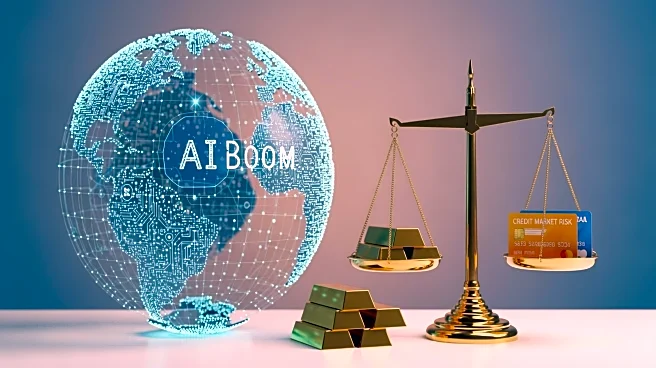What's Happening?
The U.S. economy is experiencing heightened tension due to a combination of factors including speculative investments in artificial intelligence and instability in private and subprime credit markets.
The concept of a K-shaped economy, where the wealthy continue to prosper while the poor face increasing challenges, is becoming more pronounced. This economic fragility is exacerbated by recent bankruptcies in the subprime auto lending sector, raising concerns about potential widespread financial instability. Jamie Dimon, CEO of JPMorgan Chase, has likened these risks to 'cockroaches,' suggesting that visible failures may indicate deeper systemic issues. Additionally, the Federal Reserve is expected to cut interest rates, but faces challenges due to a lack of regular government data, complicating economic assessments.
Why It's Important?
The current economic situation poses significant risks to various stakeholders, including investors, businesses, and the general public. The speculative AI stock market boom, while driving growth at the top of the economic ladder, could lead to a downturn if investments fail to deliver expected returns. This uncertainty impacts investor confidence and could lead to broader economic repercussions if the bubble bursts. The instability in credit markets further threatens financial institutions and borrowers, potentially leading to increased bankruptcies and financial distress. The Federal Reserve's actions, constrained by limited data, could influence interest rates and monetary policy, affecting borrowing costs and economic growth. These dynamics underscore the precarious balance within the U.S. economy, with potential consequences for employment, consumer spending, and overall economic stability.
What's Next?
Investors are advised to adopt strategies that mitigate risks, such as diversifying investments or focusing on long-term value rather than short-term gains. The Federal Reserve's anticipated interest rate cut may provide temporary relief but could also signal deeper economic concerns. Stakeholders, including policymakers and business leaders, will need to navigate these uncertainties carefully to prevent potential economic fallout. The ongoing developments in AI and credit markets will require close monitoring to assess their impact on the broader economy. As these situations evolve, the focus will likely shift towards stabilizing economic conditions and addressing underlying vulnerabilities.
Beyond the Headlines
The current economic climate highlights ethical and cultural dimensions, such as the widening gap between different socioeconomic groups and the role of technology in shaping economic futures. The reliance on speculative investments raises questions about sustainable growth and the ethical implications of financial practices that prioritize short-term gains over long-term stability. Additionally, the cultural impact of economic uncertainty may influence public sentiment and societal attitudes towards technology, finance, and government policies. These factors could lead to shifts in consumer behavior, political discourse, and regulatory approaches, shaping the future landscape of the U.S. economy.









